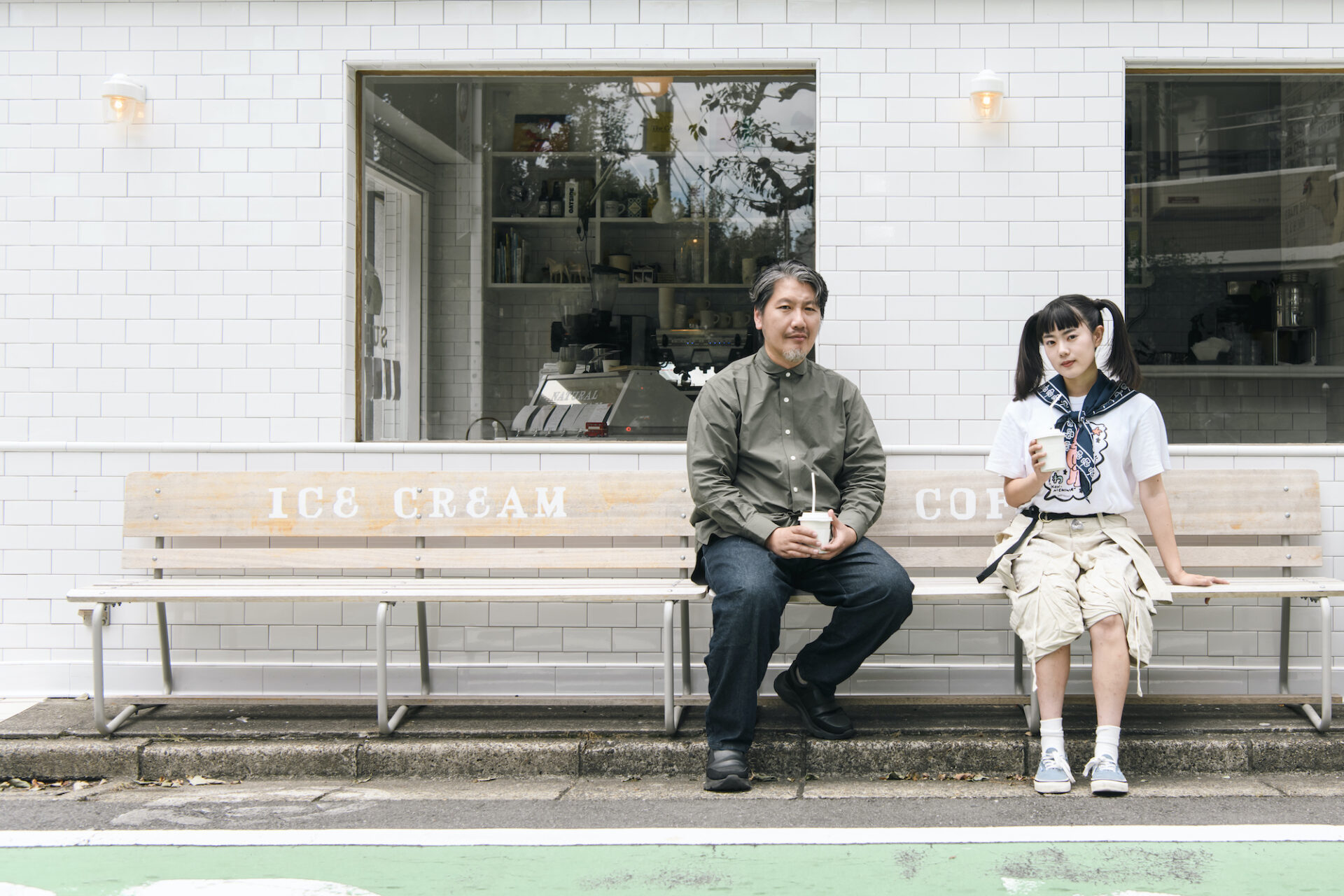
2024-08-22
Vol.9
Idol and Artist
Beni Usakura (usabeni)
-
Neither Optimistic Nor Pessimistic
-
The Generation of Transitional Period
-
Between "Expression Desires" and "Economic Rationality"
-
Lean on People to Learn
-
Never Give Up Changing "Unchanged"
Beni Usakura’s activities attract people. She has many faces as an idol, artist, designer, DJ, and shop owner, even travels abroad by herself to open a new avenue in her life. She is one of the so-called Generation Z, whose characteristics are often described as “never showing true feelings” or “difficult to understand what they think.” However, her career is so straightforward to her desires and full of uniqueness that it gives the impression that categorizing her in simplistic generationalism is a waste. “I want to show the world that there are many ways,” she says. Her words are convincing because she has improved her identity through the “difference” rather than competing with others by the same standard. One will gain new insight by leaving preconceptions about the young generation aside and empathizing with the recognition and value of the 25-year-old, who purely faces her intrinsic motivation.
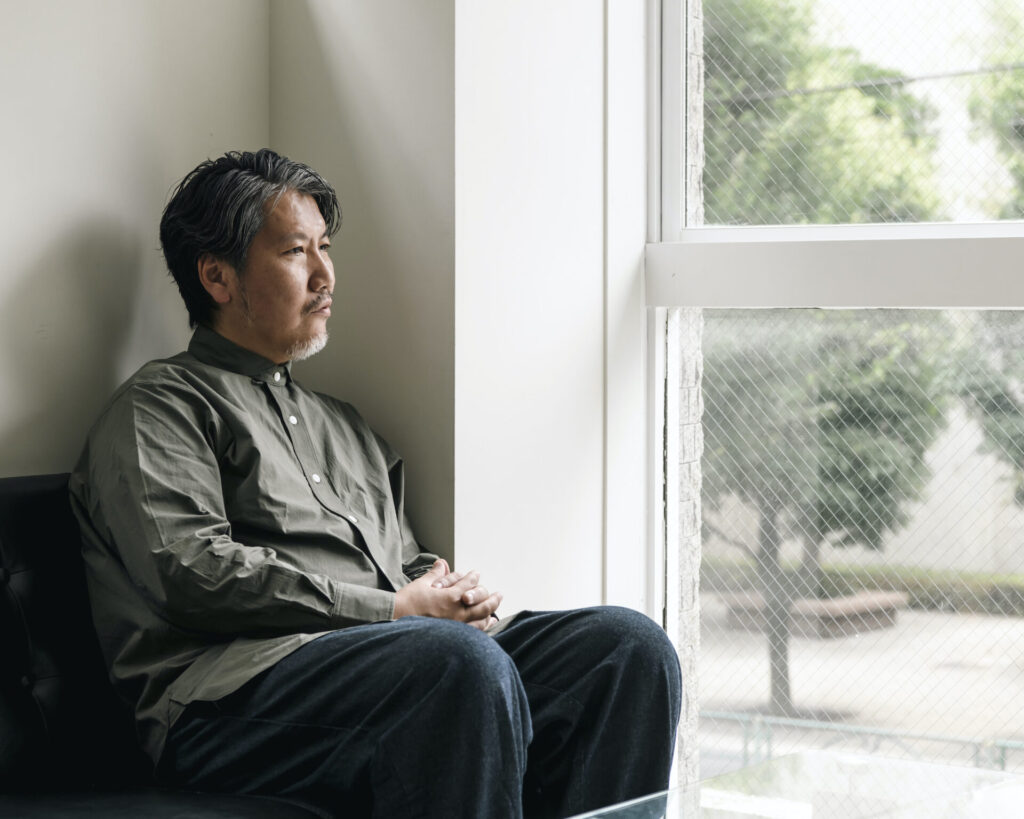
“Young people are not overly optimistic about the future of Japan, but not pessimistic about it, either.” (Shigeta)
Masakazu Shigeta: Many of my music friends were connected with Beni-chan, but I didn’t have an opportunity to meet her in person. So, I followed her Instagram accounts and checked what she was doing, which I found pretty interesting. Although we have an age gap of about 20 years, I empathized with her taste in music and approach to clothing design.
So far, most of the guests of Idealism have been males of my generation or older. Talking with them, I found they have many concerns about Japanese society, but I felt at the same time that it might not be so lamentable depending on how you look at it. I supposed that young people are not overly optimistic about the future of Japan but not pessimistic about it, either. I wanted to ask about that point, so I invited her as a representative of the young generation today.
Beni Usakura (usabeni): When I suddenly received the e-mail for the offer, I wondered, “Are they really OK with me?” But, at the same time, I was so proud of myself. My taste may be a little different from those of average people, but at the same time, I don’t think I am unique that much. So today, I want to talk about various things as a female in her twenties.
Speaking of Japanese society and its future, I am not so pessimistic about it. I went overseas for the first time last year, and since then, I have come to think that this country has many good points. In Thailand, where I went, you can’t flush toilet paper, and the roads are not well-paved and bumpy in many places, and the air pollution is severe. I realized that things I had taken for granted in Japan are not at all standard in other parts of the world.
——What made you decide to visit Thailand?
usabeni: I’ve been interested in the Thai music scene for a while and have always wanted to release my music there one day. Actually, I have been feeling the limitations in Japanese music culture, and I thought, at this rate, my activities would eventually reach the ceiling. I decided to visit Thailand because I believed I could not grow further and expand my activities without going out of Japan and connecting with the people abroad.
When I physically went there, I found many people wearing T-shirts with Japanese words printed on them, and Japanese music and idol culture were widely accepted. I was so surprised that the Japanese-style idol format of so-called “underground idols” was also recognized and accepted in the idol scene in Thailand. So, I initially thought performing in the same format as Japan would be a good idea. However, since I am a solo artist, not a group, I noticed I could not compete with others in terms of the sheer weight of numbers. I had a second thought, and to show my individuality as a solo artist, I changed my positioning to more like an artist side rather than an idol. Now, I am collaborating with the local artists to create music.
——You said the city you visit is Chiang Mai.
usabeni: Yes. Bangkok is an excellent city, but in northern Thailand, where Chiang Mai is located, the city is compact, and I feel more comfortable there. There are many small but unique stores in the local culture here and there, and the atmosphere fits me.

——Mr. Shigeta, you have been to Thailand many times. What is your opinion of the story she just told us?
Shigeta: There was certainly an atmosphere in Bangkok 20 years ago where people unconditionally appraised Japanese culture, but I think such an atmosphere is already gone. The reason is simple: they can create animation and idols on their own now. There is no need to import them from Japan. The same goes for fashion, music, and art; Thailand is full of energy now.
——It is true that the presence of Thailand in the fields of art and culture is increasing year by year.
Shigeta: Among Asian countries, South Korea now has the highest level of information literacy in art and culture. They cover every Western culture, from the major to the underground ones. They import them, produce them on their own, and re-distribute them to Asian areas.
In the 1990s, Japan excelled at quickly catching up with Western trends and collecting and re-editing them to create new products. In that sense, what South Korea does today is similar to what Japan did in the 1990s. At the time, Japan drew envious stares from Asian countries.
——And now the position has been replaced by South Korea, right?
Shigeta: We can say that Japan is becoming overwhelmed by South Korea now, but at the same time, it is an opportunity for Japan to try something new after the culture has come full circle. Then, what should Japan do from now on? I think her generation will lead the way. You don’t have to think seriously, like, “We are going to redefine how Japanese culture should be!” because I believe their generation
is characterized by the ability to create such things naturally.
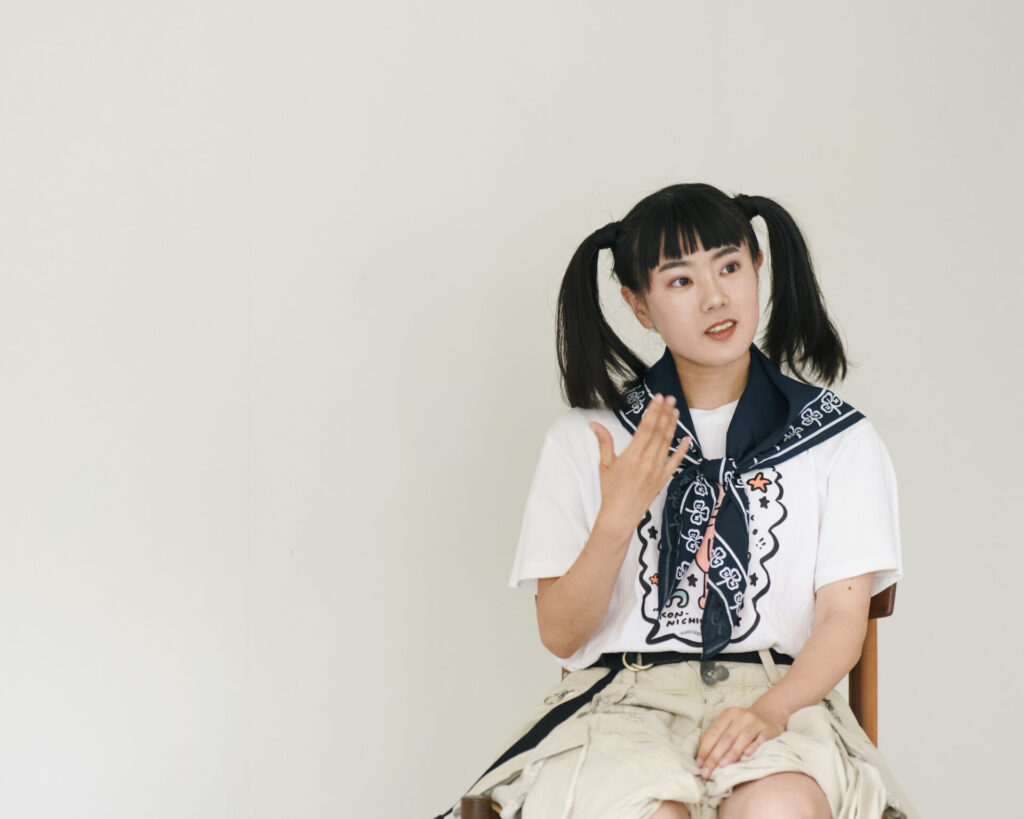
“Not everyone likes the same things. Probably, there are no longer goals or targets everyone has in common.” (usabeni)
Shigeta: I recently visited Finland, which has ranked first in the World Happiness Report for seven consecutive years. When I went there, I felt as if the entire city was “waving the white flag,” and they were as if to say, “We have abandoned the act of fighting or competing entirely.” You can explain that they are doing things at their own pace, but my impression is slightly different. Even in how they dress, there is no atmosphere where people try to be more stylish or spend more money than others. I felt the attitude of “abandonment of competition” might be the factor in their high happiness index.
However, perhaps because of their attitude, the city has no atmosphere of excitement. The city of Bangkok is exciting, isn’t it? That kind of energy fosters new cultures, and people gather there, being attracted by it. That is why I frequently visited Bangkok when I was your age, and I think you are the same as me. With this in mind, I want to know which direction Japan should take. I believe the key to the answer lies in interpreting the meaning of competition with others.
usabeni: As for myself, I don’t have the mindset to use someone as a stepping stone to success. I don’t deny my feeling of becoming wealthy, but I don’t intend to sacrifice my pastimes or current work style for success.
On the other hand, I often come across clips of girls who excessively visit host clubs on YouTube and the word “Host Club Fanatic.” Many get plastic surgery to become number one in the night entertainment business. I feel young people’s attitudes have become really polarized.
I am the type of person who enjoys just strolling down the town, which might be granma-ish. Still, I use SNS and cherish human connections. But those with extreme personalities sometimes stop using Instagram entirely or don’t respond to my LINE messages. Then, when I asked what they were doing, they were like, “I was reading a book,” or “I was stroking my cat.” Not everyone likes the same things, but it is pretty interesting. Trends and pastimes are all different from individual to individual. Probably, there are no longer goals or targets everyone has in common.
Shigeta: I imagined that the world of idols is a place where the principle of competition dominates, and severe competitions, even among group members, frequently take place. AKB, which chooses its center performer through the election, is a good example, but it is surprising to know how idols also tend toward polarization. In a sense, you are the generation of the transitional period.
usabeni: Nowadays, more and more idols have left the group and switched to solo artists like me. Many idols are now simultaneously involved with management, direction, live performances, and product sales.
Shigeta: In the past, it was the standard for people to improve their expertise first, and only after they succeeded did they start working in another field, but everything might be going in parallel now. Rather than putting massive effort into one thing, people create their identity and creativity by doing things in parallel. That was my ideal style when I was young, and I am really jealous of you doing it naturally.
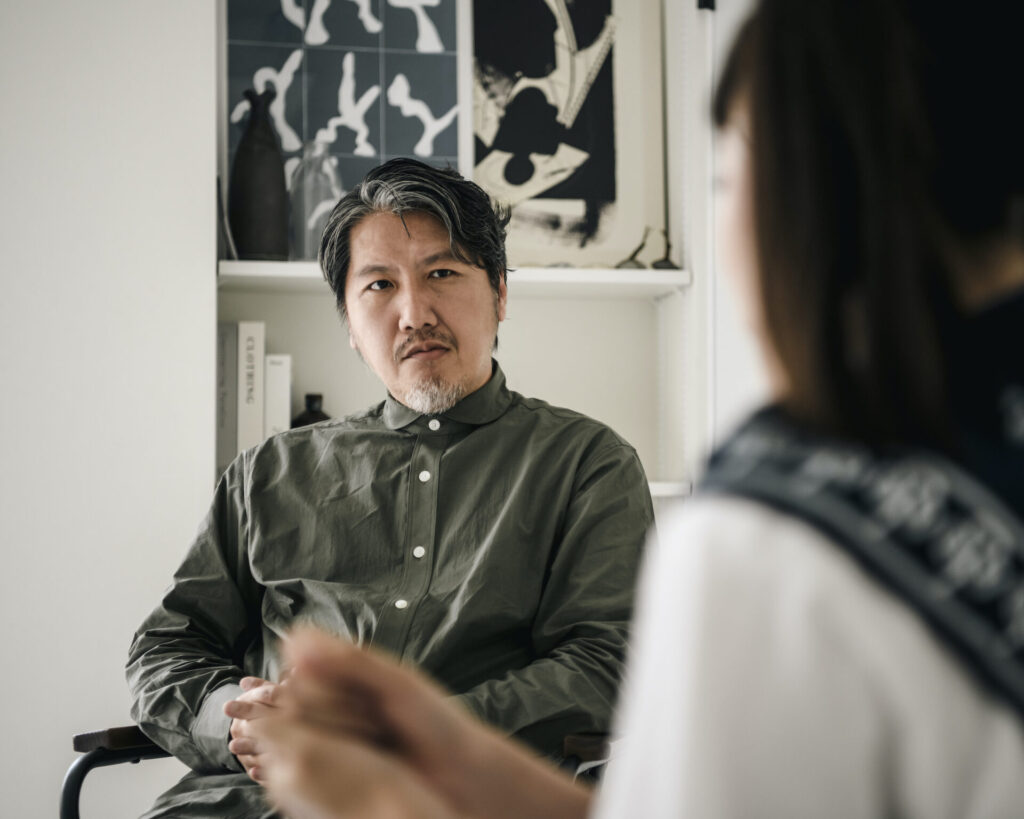
“Diversifying the economic income is a very rational idea.” (Shigeta)
usabeni: The other day, a person pointed out that those pursuing parallel careers have in common the desire for expression rather than the desire for approval, and I totally agreed with the idea. I do things at my pace, not because I want to be approved by someone but because I love to express myself. Of course, there are tough times, but the joy of expressing myself is much greater. I feel many people around me think similarly.
Shigeta: The word “desire for expression” really has a point. In our generation, it is natural to have “the desire for approval,” and I think it is one of the strongest needs. I want to be approved by my father, I want to please my mother, I want to be recognized as a good boy, and so on.
My daughter recently said that she wants to attend make-up school, and perhaps it is also a pure desire to express herself through make-up. She wants to do it not because she wants to be approved by someone, so her motivation will not be influenced now, no matter what her parents say. So, now we find it difficult to find a common language.
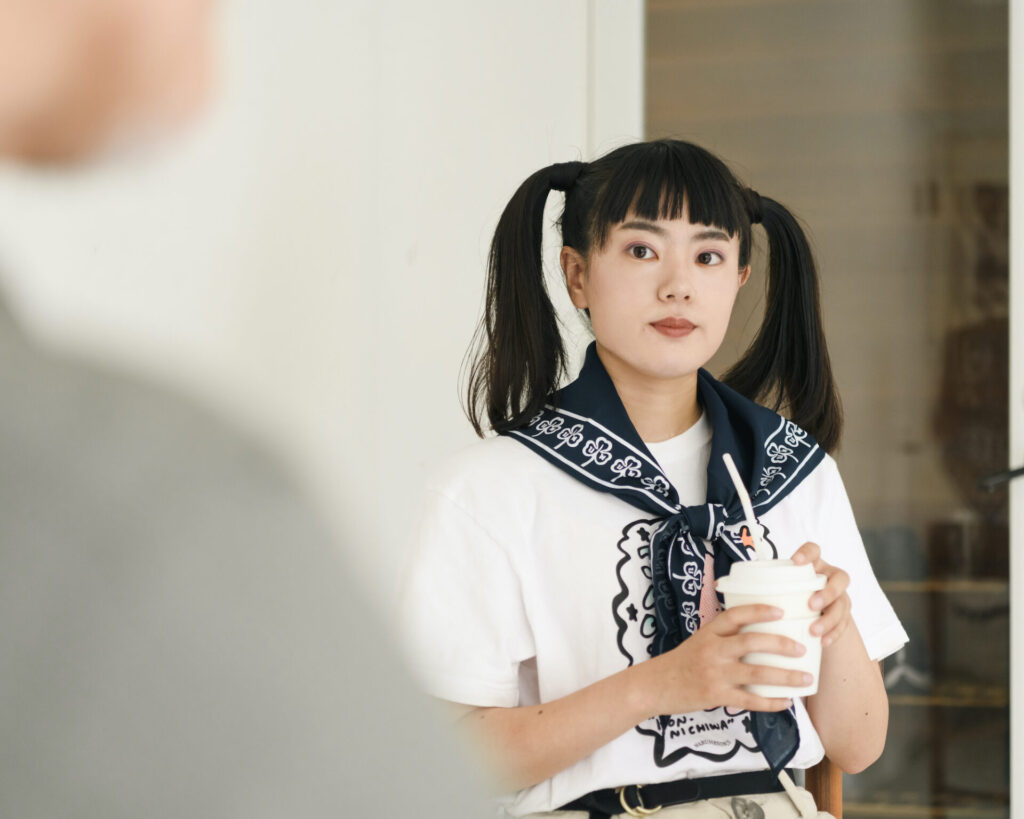
usabeni: Once you start thinking about approval from others, you begin to think about many unnecessary things and, in the end, feel that you don’t need to be the one who does it. So, I try not to think about it.
Shigeta: But no matter how much desire for expression you have, it alone doesn’t make an economy begin. This is because an economy can only exist with people who accept what you make. Then, do we have to pay more attention to the masses to become accepted by people? Actually, it is not always the case. Music with a strong personality has limited demands, so it is OK that you try what you want with the feeling that you receive social tipping from those who like your music. Diversifying the economic income like that is a rational idea.
usabeni: When I was only active as a member of an idol group, most of my income came from selling photos taken by Instax. After the live performance, we took pictures with the fans and sold them for 1,000 or 1,500 yen each, and some part of the sales were paid to us as the allowance for the day. I thought it would be tough to keep doing it. But there was no way I could be a company employee or something, and above all, I loved being an idol, so I had to secure a source of income other than that. So, I started making and selling my goods. After selling it online, I realized that it would be better to have a physical store, so I opened it in Kobe. On the one hand, I have been following my desire for expression, but on the other hand, I have considered the economic aspect of making ends meet, which has made me settle down to the current style.
——You said you have expectations of the culture provided by local areas. Is that the reason you had a shop in Kobe?
usabeni: Yes. I started DJing when I was active in an idol group, and I got many offers from local venues because it is easier to invite DJs since they are basically solo. I also performed in Takasaki in Gunma. Through it, I learned about the small communities and cultures maintained by local record shops and movie theaters, which were fresh experiences for me. I noticed interesting people everywhere, and the experience made me decide to open a shop in a place other than Tokyo.
Once a place is established, people gather for it, right? The shop’s name is NARUHESON’S, and I would be happy if many people came to Kobe to visit my shop.
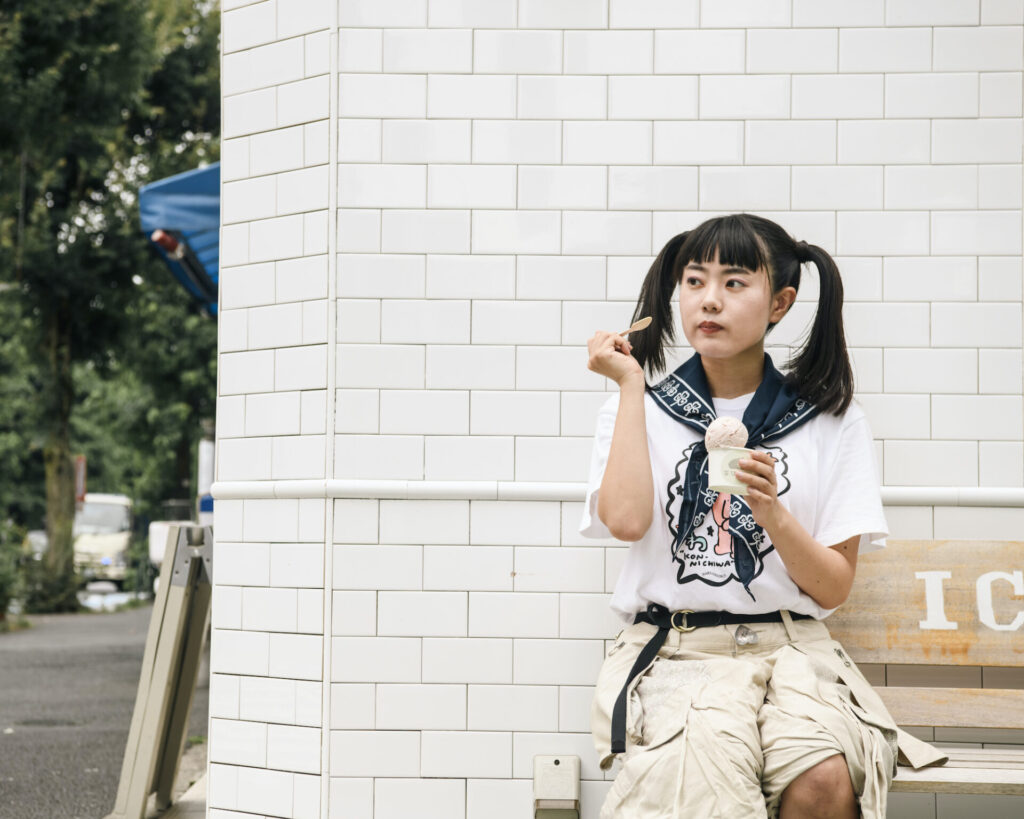
“If I had had to decide everything alone, I would have quit my idol career long ago.” (usabeni)
Shigeta: We are planning to do something together at a makeup-related event this December. Having an interest in make-up in childhood is considered “precocious,” and in adulthood, “grooming,” but nobody teaches it correctly during the years of growing up. As a cosmetics company manager, I have always thought it was strange.
In the world of make-up, there are concepts like “suited,” “unsuited,” and “challenge,” and the best part of make-up is that it contains many nuances and meanings in it. If that is the case, I want to teach children the basics correctly before they grow up. So, I started a make-up workshop for elementary, junior high school, and high school students with the make-up artists of OSAJI, and I am planning to expand the scale this December. It is like they make their debut in a social gathering by doing make-up, tidying up their appearance, and watching the live session in Shimokitazawa at the end of the day.
I want to make the event an opportunity to learn not only how to make up but also how many different jobs they can possibly do when they grow up. When I thought about the role model, I thought Beni-chan was the best for it. It is not that there is something wrong with focusing on one thing and earning money, but as the word “parallel career” shows, there is an alternative to doing things in parallel. She embodies it, and I want to show her way of life to children.
usabeni: I am so glad to hear that.
Shigeta: Few children can give a straight answer to the question of their future dreams. First of all, it is nonsense to discuss something like that by ignoring talent. Actually, children understand that advice like “You can become anyone if you do your best” has no meaning. Children nowadays judge things that calmly.
In the first place, the way people are should be more diverse, and it is wrong to think that you have to focus on only one thing. I occasionally had periods in my life when I had to concentrate on one thing, but in the end, I have chosen a position where I can do many different things. Only some adults nowadays advise children that it is OK to do many things, so I want to convey the message at the event in December.
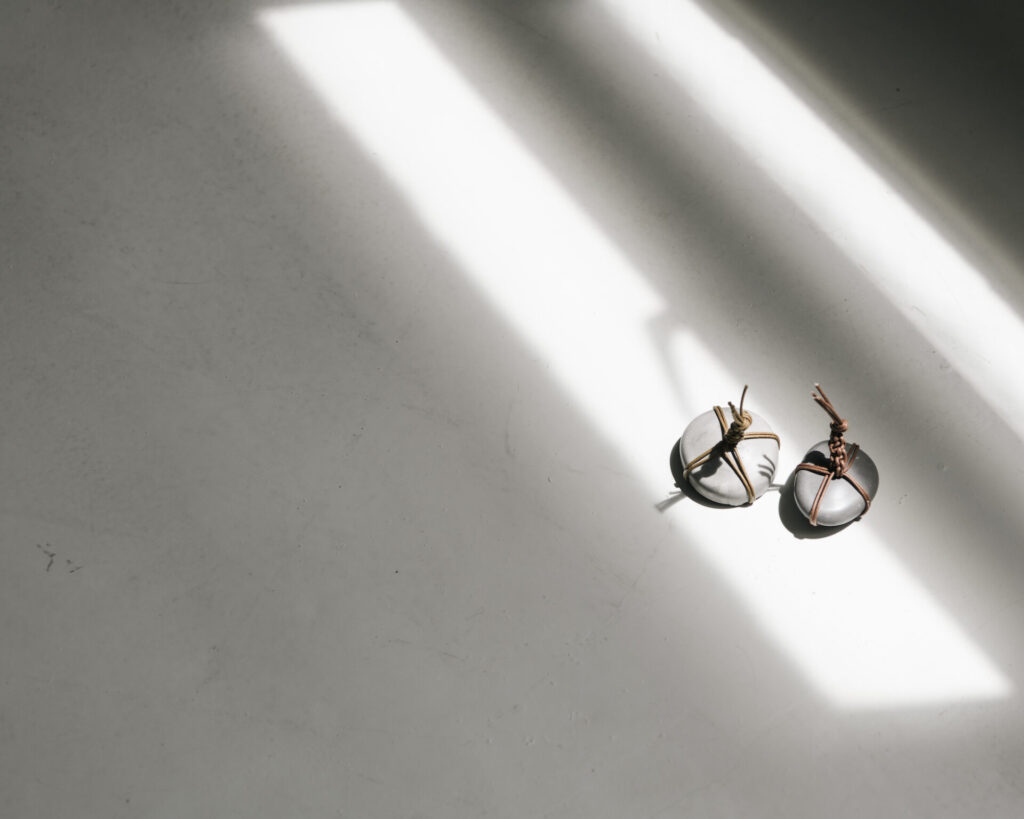
——Did you have adults who gave you advice or you could consult with when you were at a crossroads?
usabeni: I think I would have quit my idol career long ago if I had had to decide everything alone. I would have been lost in the way, mentally suffered, and ended up shouting on SNS, “I’d rather die!” and like, that was it. Now, I have a manager working with me who is also like a mentor. After all, it is difficult to do everything on my own. In that sense, I believe young people shouldn’t hesitate to consult with adults. Some young people lose their bearings by shutting out people around them.
Shigeta: You must have been influenced by Mr. Gakuji “CHABE” Matsuda of a rock ‘n’ roll band, LEARNERS, didn’t you?
usabeni: Exactly. I started DJing influenced by him and LEARNERS, and from there, I met American music of the 50s and 60s, which opened the way for my music style to cover the old music in the current context.
Shigeta: When was that?
usabeni: I was probably in the third year of high school around that time. I started hanging out at a club called “THREE” in Shimokitazawa, and I enjoyed spending time with stimulating people. I dressed up a bit, watched the live performances, and moved my body to the sounds of the DJ. It was a place of social interaction for me, and Mr. Matsuda was really kind there. I decided to give such opportunities to children when I grew up. He and the people in the music industry there taught me a lot.
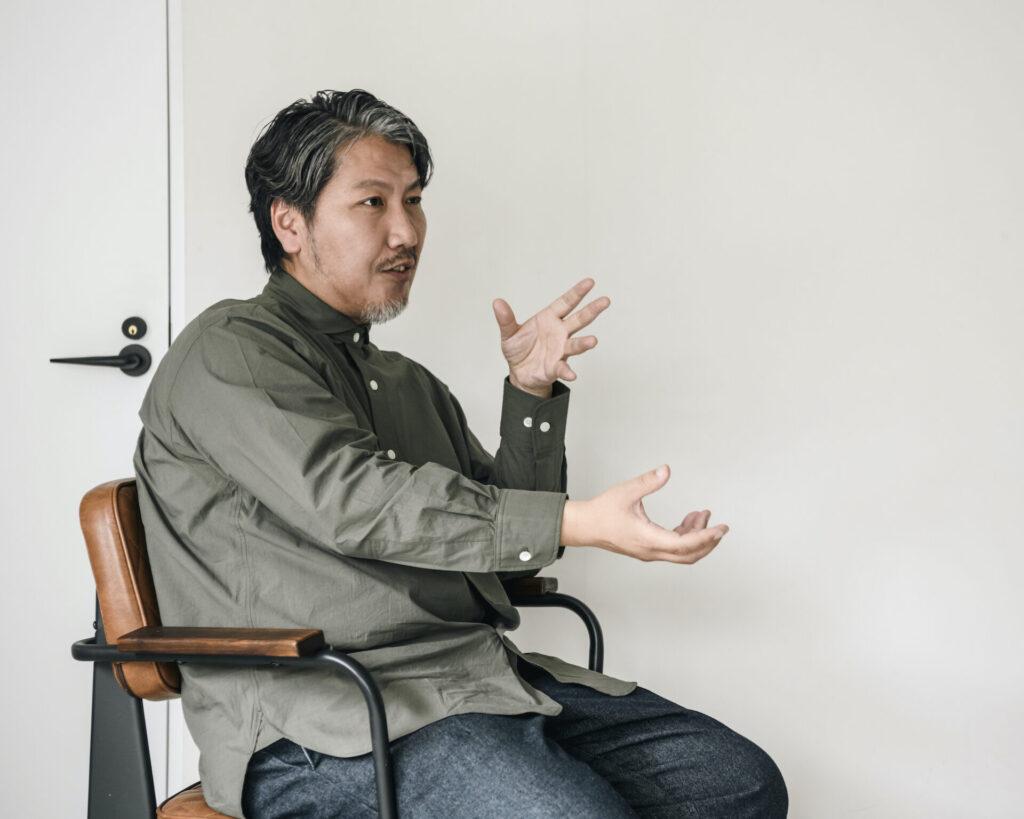
“For better or worse, it is encouraging that young people think change is the most important.” (Shigeta)
Shigeta: People learn many things through their experiences in adult society, and I believe those with such experiences are fascinating. In my twenties, I had good relationships with those in their later forties and had drinks with them almost every night. That was what I enjoyed most at the time. Above all, the stimulation they gave me was refreshing. I kept close relationships with them later on, and when I quit my career as a music engineer and opened a live music venue in Takasaki, they supported me in many ways, including renting me the space for my business. The owner even said, “You can pay the rent after you can afford it.”
——It would be great if we could have more inter-generational communication.
Shigeta: Adults who have opportunities to meet young people who have the courage or chance to enter the adult world are pretty lucky, actually. You can refine your sensitivities by communicating with and sometimes being irritated by fearless young people. I believe it is good for adults to prevent their senses from getting old.
——Usabeni, you went to clubs in Shimokitazawa as a teenager and received a lot of stimulation and advice from adults. Now, do you have words for young people in their teens like yourself back then?
usabeni: Having multiple places you can depend on is probably better. As for myself, concentrating only on my activities as an idol would have been tough. For example, school is not the only place to obtain knowledge regarding learning opportunities. Your sight is inevitably narrow as long as you depend on one thing. I want to tell them how important it is to have multiple places you can rely on and that there are many different worlds in the world. It is OK to have it in the digital world. At the same time, I believe we adults must make more efforts to create such places.
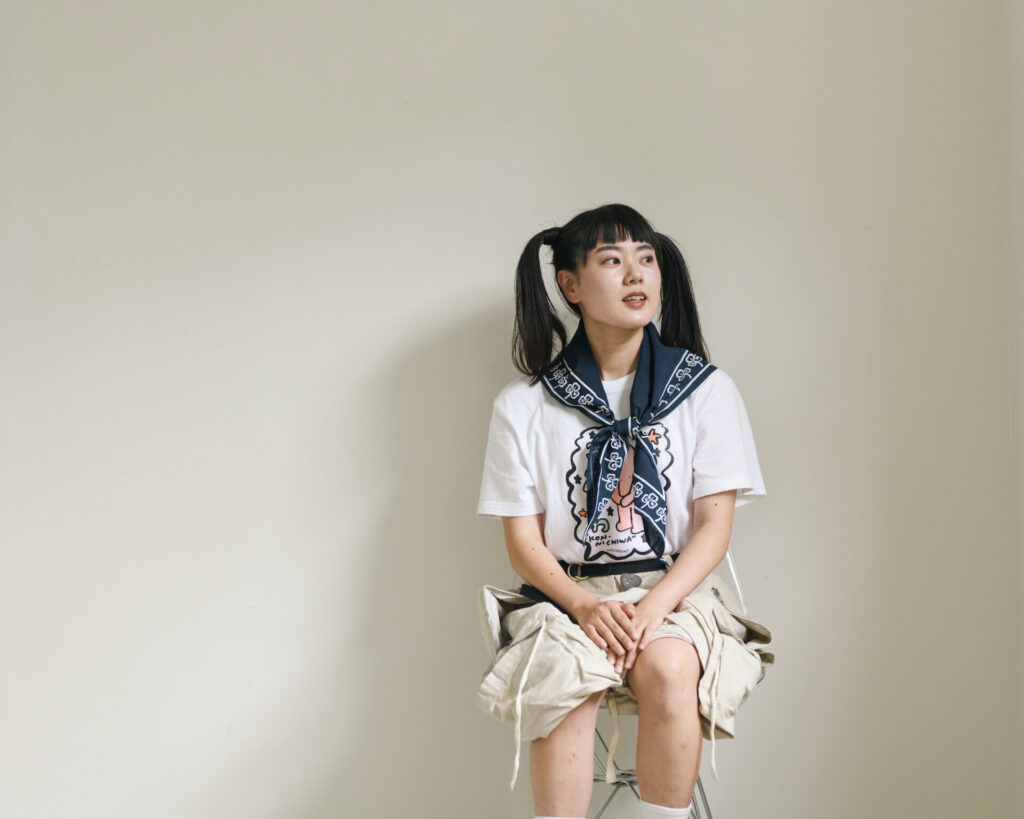
——At the beginning of this interview, you said you feel limitations in Japanese music culture. In which part do you feel so?
usabeni: For example, I found it in the design of the CD jacket. South Korean artists release CD jackets with high-quality designs, even if they contain only a single song, filled with surprisingly large numbers of pictures. If we try to do the same thing in Japan, the distributors and retailers will immediately deny it. They don’t accept the design just because the artist’s name and the title of the song are not on the backside. Now that people listen to music on the internet, it is difficult to understand why their intentions judge the jacket’s design. Probably, it is no problem to change it, but after all, everybody accepts the status quo, which I found really frustrating. I have many complaints like that. (laughs)
Shigeta: When we have the choices of “good,” “bad,” and “status quo,” the story you just mentioned makes it clear that “status quo” is the worst choice. I think the young generation’s voting behavior in the Tokyo 2024 election was a sign of such a will.
After all, it is the young people who create the next era. For better or worse, it is encouraging that young people think change is the most important. I have gained good insights from this point and others today.
usabeni: I have been wondering if they are OK with me even after this session started. However, having talked with Mr. Shigeta, I could reflect on my activities once again, and I realized that, although I have followed my desire for expression, I have also tried to balance my activities and economic rationality as an idol with the idea that idols give value only after being consumed by people. The expression of clashing culture and economy is something only I can do, and re-recognizing this point has made me confident.
Shigeta: If your generation is experiencing a transitional period, I want you not to give up on changes by just complaining about the current situation. Instead, I want you to have expectations for the changes in the coming days. I must tell my children to do their best when I go home! (laugh)
Note:
LEARNERS
A five-piece rock’ n’ roll band evolved from the unit of Mary Sara, a model and singer, and Gakuji “CHABE” Matsuda, who had been active in band activity while running a gallery in Harajuku, Tokyo. They started their activity in full swing with the release of their first album in 2015 and gained a reputation for live performances and their unique sense of covering appealing songs regardless of the genre. After the live performance at FEVER in Shindaita in December 2023, the band has gone on hiatus.
air / usabeni
atmosphere / usabeni
Profile
-
Beni Usakura (usabeni)
Born in Kanagawa prefecture in 1998, usabeni began her idol career as a member of an idol group, “avandoned,” when she was 15. In 2022, she became a solo idol and artist and has directed all artwork, including graphic design and choreography. In 2020, she opened a shop for her brand “NARUHESON;S” in Kobe, and regularly releases apparel and zines. At the end of May 2024, she released her newest EP, “AIR,” which includes three new songs and one remix of an existing song. It is available on various music platforms, and CD is now on sale at the online store of NARUHESON;S.
-
Masakazu Shigeta
After working as an engineer in the music industry, Shigeta began his career as a cosmetics developer in 2001. Since 2004, he has produced a variety of cosmetics brands in the healthcare business of Nitto Denka Kogyo Co., Ltd., a metal surface treatment company founded by his great-grandfather.
In 2017, he founded “OSAJI,” a skincare lifestyle brand, and became the brand director. He also produced “kako,” a specialized shop for home fragrances perfume in Kuramae, Tokyo, in 2021, and a combined shop of “OSAJI”, “kako”, and a restaurant “enso” in Kamakura, Kanagawa, in 2022.
In 2023, using Nitto Denka Kogyo’s skills, he also produced a pottery brand, “HEGE.”Publications
Taberu Biyou (Eating for Beauty) (SHUFU TO SEIKATSU SHA, 2024)
42-Sai ni Nattara Yameru Biyou, Hajimeru Biyou (Beauty cares to quit and start when you turn 42) (Takarajimasha, 2022)
Information
NARUHESON;S
A select shop run by usabeni. The store opens for a limited period each month in Kobe. It plays a role in fostering local culture through various activities, including collaboration with a long-established local egg omelet store.
https://naruhesons.thebase.in/
-
Photographs:Eisuke Komatsubara
-
Text:Masahiro Kamijo
-
Hair and Make-up Coordinator:Yuya Goto(OSAJI),Aya Ito (OSAJI)
-
Location:SUHO
NEWS LETTER
理想論 最新記事の
更新情報をお届けします
ご登録はこちら
ご登録はこちら
メールアドレス
ご登録ありがとうございます。
ご登録確認メールをお送りいたします。